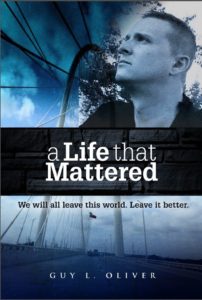He was born to working class parents in Cushing, Oklahoma, a very small community not far from Tulsa. His given name was Ted Lester Oliver, though he went by the moniker TL, and he arrived in his humble surroundings on July 8, 1933, the very nadir of the Great Depression.
We have no cultural memory of this time in American history. We do not as a people recall that it was a time that shunned hope and extinguished dreams, and that no corner of the industrialized world was untouched. The entire planet, it seemed, was on the precipice of a collapse and imagination fails me as I think of my grandparents’ determination. To spend each day looking for work, to turn to each other and their community for hope, at times, perhaps, knowing that the day would bring only desperation with no fruitful outcome.
And my father was born to this era. A time and a place when an extra mouth to feed could often be a terrible burden to parents—something I believe we can’t fully grasp in the 21st century.
And thoughtfully I wonder.
Did he carry the burden of that desperation—however subtle—as a child? Did he feel the weight his own father carried as he struggled to provide for him, his mother, and his two sisters? Did he see the fatigue and worry in his father’s eyes?
The guess I hazard is yes, his drive for success thus explained. But miscalculations in the manifesting created setbacks.
Just as my mother was the product of a kind mother and troubled father, my father was the product of a loving father and an emotionally distant mother. This left my father with a craving for female companionship that, at times, overrode his drive for success. He fell in love easily and often and at the budding age of 19 married a 17 year-old girl from the office where he worked, June Mitchel. A year later they conceived and June gave birth to my father’s first son, Kim.
At this point I must pause and address my use of the term miscalculation. I’ve met my father’s first wife and I know her to be a lovely woman and devoted mother to her son. I also have no reason to believe that she was nothing if not a devoted wife to my father during their marriage. Further, I have an undying devotion to my older half-brother Kim and it would therefore be a mischaracterization to suggest that my father’s first marriage was in any way a mistake. To the contrary, I think it ultimately laid the groundwork and brought him to the alter of service that was his calling.
That said, it cannot be denied that this chapter of dad’s life served only to distract him from the success he so desperately wanted.
Competing needs.
The need for a mother’s acceptance and affection in childhood prematurely drove him to the fairy tale of romantic entanglements with an idealized partner. And this, a situation at odds with the requirement of a focus on education and profession that a successful career demands, strained his first marriage to the breaking point. A bitter pill at a tender age—but one that taught him commitment, devotion, and determination to finish whatever he set his hand to.
The hallmark of my father’s life was that he, like most of us, learned from his mistakes but, unlike so many of us, he carefully and thoughtfully embraced each lesson and was determined to be better for it. Nothing, however large or small, it seemed, was ever lost on my father. He saw every experience as an event that either reinforced his worldview or changed it, his moral compass informing the outcome.
So many of us simply drift through life never thinking much about how individual events fit into our approach to life. As humans, we tend to have a sense of the world formed in childhood through the teachings of parents and other influential adults. Our experiences of adulthood do, of course, modify our thinking and attitudes if we are thoughtful, but so many of us respond to events with a reaction harmonious to our existing worldview. Dad refused that approach.
Soon after his marriage ended at age 23, an act of his doing, not hers, he stepped back and considered the price paid by his former wife and first born in the aftermath. At the time he was attending Tulsa University, studying mechanical engineering but his divorce introduced an unforeseen variable. In 1956, the draft was still in effect but as a married man attending college and raising a child, dad was exempt. His divorce changed that.
A 23 year-old with three years of college and divorce papers, he was the ideal candidate for conscription at a time when the U.S. was transitioning out of Korea and into Viet Nam. And this induced an enforced separation from his former family. No longer did he have the luxury of being involved in his son’s life as a noncustodial parent and he knew the price to Kim was a premium. It also weighed heavily on him that his former wife would have to fill the gap both emotionally and financially for them both.
He never really spoke of his training in the Army; only that it involved the contingency of the U.S. re-involvement in Korea and forward operating missile bases presumably in Viet Nam. During that era, men training for and engaging in live combat typically did not speak of their experience, but I knew from the questions I asked about Kim that regret regarding the time training took from Kim besieged him with a vengance. A guilt that could not be assuaged.
That in itself is not remarkable; rather, what he did with it was rare. He used the circumstance of what he considered his marital and parental failure as a reminder to his later obligation to my mother. Once ensconced in his second marriage, no matter how challenging the moment, devotion to my mother became the thing of focus for him.
And it was within his very obsession of devotion to my my mother that the thing of beauty their union eventually presented to the world was fostered. Had he not walked away from his previous marriage and the lesson of devotion it taught him, it is doubtful he would ever have embarked on his life of service.
Just occasionally it is the catalyst of failure that foments the wherewithal to find our calling. Such was the case of my father.


